人教版八年级英语下册教案Unit 9 第1课时
- 格式:doc
- 大小:63.50 KB
- 文档页数:5
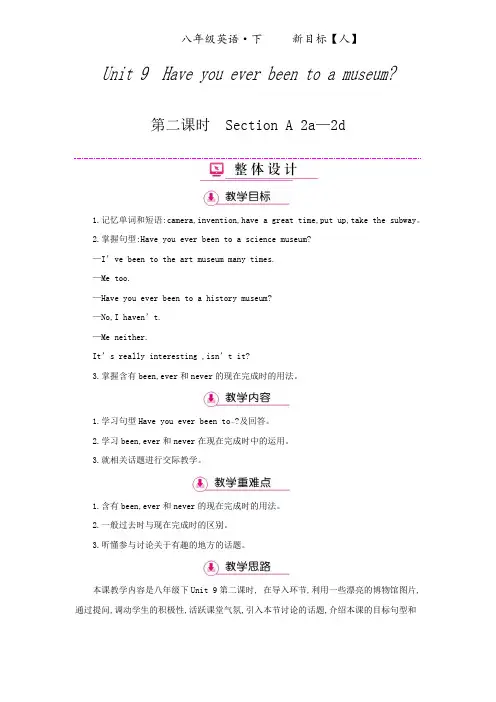
八年级英语·下新目标【人】Unit 9 Have you ever been to a museum?第二课时Section A 2a—2d1.记忆单词和短语:camera,invention,have a great time,put up,take the subway。
2.掌握句型:Have you ever been to a science museum?—I’ve been to the art museum many times.—Me too.—Have you ever been to a history museum?—No,I haven’t.—Me neither.It’s really interesting ,isn’t it?3.掌握含有been,ever和never的现在完成时的用法。
1.学习句型Have you ever been to…?及回答。
2.学习been,ever和never在现在完成时中的运用。
3.就相关话题进行交际教学。
1.含有been,ever和never的现在完成时的用法。
2.一般过去时与现在完成时的区别。
3.听懂参与讨论关于有趣的地方的话题。
本课教学内容是八年级下Unit 9第二课时, 在导入环节,利用一些漂亮的博物馆图片,通过提问,调动学生的积极性,活跃课堂气氛,引入本节讨论的话题,介绍本课的目标句型和单词,在听力环节,注重对学生听力策略的指导,消除学生对听力的“恐惧”心理,让学生能够高效做题。
2d教学是本课综合运用的体现。
通过学习词组、重点句到对话的填空让学生的学习有渐进的过程;抽取学生进行角色扮演,对学生是知识升华的过程。
设计教学PPT,录音机,图片,多媒体。
StepⅠ.Lead in[设计意图]调动学生情感,激活他们头脑中关于过去去过的地方的情感,导入新授。
Leading inT:Boys and girls,do you like traveling?S:Yes.T:Great! Most of you like traveling very much.Me too.Look at the pictures.I went to a lot of places last year.Guess where I went? Use “have/has been to”.S1:You have been to Shanghai.S2:I know you have been to the space museum.S3:You have been to the amusement park.S4:You have been to the zoo.S5:…T:Great! All of you did well.I have been to so many interesting places.Which of these places would you like to visit? Please rank them 1 to 6.space museumhistory museumart museumwater parkzooamusement parkS:…[设计意图]通过情境引入,激发学生情感,便于导入新授内容。
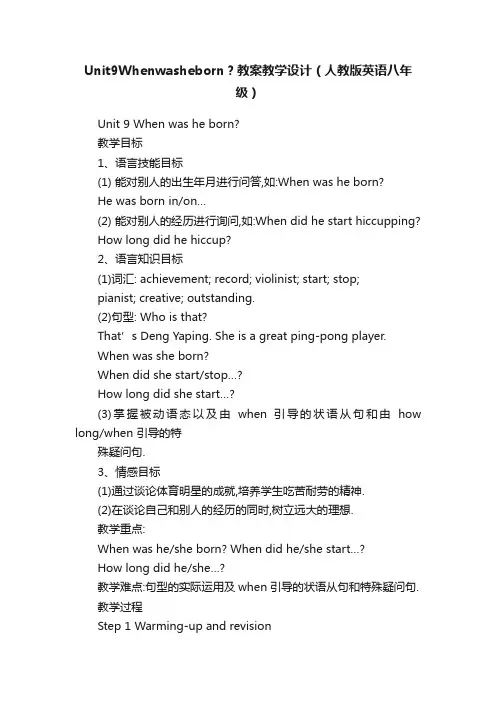
Unit9Whenwasheborn?教案教学设计(人教版英语八年级)Unit 9 When was he born?教学目标1、语言技能目标(1) 能对别人的出生年月进行问答,如:When was he born?He was born in/on…(2) 能对别人的经历进行询问,如:When did he start hiccupping?How long did he hiccup?2、语言知识目标(1)词汇: achievement; record; violinist; start; stop;pianist; creative; outstanding.(2)句型: Who is that?That’s Deng Yaping. She is a great ping-pong player.When was she born?When did she start/stop…?How long did she start…?(3)掌握被动语态以及由when 引导的状语从句和由how long/when 引导的特殊疑问句.3、情感目标(1)通过谈论体育明星的成就,培养学生吃苦耐劳的精神.(2)在谈论自己和别人的经历的同时,树立远大的理想.教学重点:When was he/she born? When did he/she start…?How long did he/she…?教学难点:句型的实际运用及when引导的状语从句和特殊疑问句.教学过程Step 1 Warming-up and revision(1) Intercourse(2) A guessing gameGet the students to review how to describe the famous people.T:. Let’s play a guessing game. I will tell you something abouta famous woman. Please listen to me carefully, and try to guess who sheis. She is Chinese. She was born in 1973.She plays ping-pong very well. She is short. She is very great.Do you know who she is ?S: Is she Deng Yaping ?T: Yes, you are right . Now please try to describe the famous personsStep 2 PresentationThis activity introduces the difficult points.A: When did Deng Yaping start playing ping-pong?B: She started playing ping-pong in 1978.A: When did she stop playing ping-pong?B: She stopped in 1997.A: How long did she play ping-pong?B: She played for 19 years.1、Ask the students to practice the sample conversation, then makeup similar conversations.2、 Ask several students to perform their conversations.3、Learning the new words.Step 3 Practice and listenNow we are going to talk about two unusual people.Look at this picture in section A 2a and the chart.T: What are their names ?S: The man is Charles Smith and the woman is Donna Green.T: What are they doing ?S: Charles Smith is hiccupping. Donna Green is sneezing.(Help them answer)T: What kinds of world record did they have ?S1: Charles Smith had a world record for hiccupping.S2: Donna Green had a world record for sneezing.T: How long did Charles Smith hiccup ?S3:He hiccupped for 69 years and 5 months.T: How long did Donna Green sneeze ?Let students listen to the tape and fill in the “How long” column inthe chart.Let students listen again and fill in the “started” and “stopped”columns.Get the students listen and write ,then check the answers.Step 4 DrillAsk some pairs of students to perform the conversations.T: You got all the answers right now. Let’s come to section A 2c pairwork. Please fill in the blanks with information from the listening.Ask two pairs of students to Practice the conversations.T: You did very well.I’d like you to work in pairs and make the same kind of conversationabout Donna.S1:How long did Charles Smith hiccup?S2:He hiccupped for 69 years and 5 months.S1:How long did he start hiccupping?S2:He started in 1922.S1:When did he stop hiccupping?S2:He stopped in 1990.Ask several pairs to act it out.Step 5 Sum-upThink about what we learn todayStep 6 Homework1)Write down a list of famous stars about their ages, birthdays, hobbiesand achievements2)Ask your parents birthdays and help them do something.板书设计:Unit 9 When was he born?He was born in/on…When did he start hiccupping? How long did he hiccup?Who is that?That’s Deng Yaping. She is a great ping-pong player.She started playing ping-pong in 1978.。
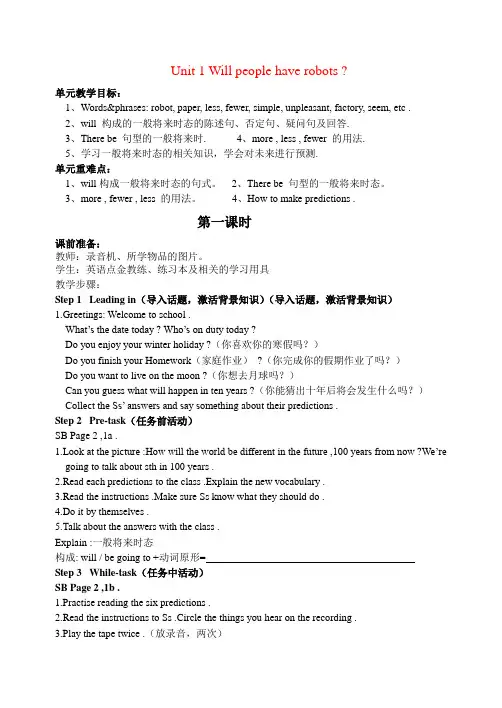
Unit 1 Will people have robots ?单元教学目标:1、Words&phrases: robot, paper, less, fewer, simple, unpleasant, factory, seem, etc .2、will 构成的一般将来时态的陈述句、否定句、疑问句及回答.3、There be 句型的一般将来时.4、more , less , fewer 的用法.5、学习一般将来时态的相关知识,学会对未来进行预测.单元重难点:1、will构成一般将来时态的句式。
2、There be 句型的一般将来时态。
3、more , fewer , less 的用法。
4、How to make predictions .第一课时课前准备:教师:录音机、所学物品的图片。
学生:英语点金教练、练习本及相关的学习用具教学步骤:Step 1 Leading in(导入话题,激活背景知识)(导入话题,激活背景知识)1.Greetings: Welcome to school .What’s the date today ? Who’s o n duty today ?Do you enjoy your winter holiday ?(你喜欢你的寒假吗?)Do you finish your Homework(家庭作业)?(你完成你的假期作业了吗?)Do you want to live on the moon ?(你想去月球吗?)Can you guess what will happen in ten years ?(你能猜出十年后将会发生什么吗?)Collect the Ss’ answers and say somethi ng about their predictions .Step 2 Pre-task(任务前活动)SB Page 2 ,1a .1.Look at the picture :How will the world be different in the future ,100 years from now ?We’re going to talk about sth in 100 years .2.Read each predictions to the class .Explain the new vocabulary .3.Read the instructions .Make sure Ss know what they should do .4.Do it by themselves .5.Talk about the answers with the class .Explain :一般将来时态构成: will / be going to +动词原形=Step 3 While-task(任务中活动)SB Page 2 ,1b .1.Practise reading the six predictions .2.Read the instructions to Ss .Circle the things you hear on the recording .3.Play the tape twice .(放录音,两次)4.Play the tape a third time .At the same time ,check the answers .SB Page 2 , 1c .1、Pay attention to the dialogues .2、Read the dialogues fluently .3、Pairwork .Work in pairs to make predictions according to the sample .4、Ask several pairs to share their conversations to the class .SB Page 3 , 2a & 2b .1、Read the predictions .2、Read the instructions and point out the sample answer .3、Play the tape twice .Ss circle the word they hear in each sentences: more , less , fewer .4、Check the answers .学生探究: less , fewer 的区别。
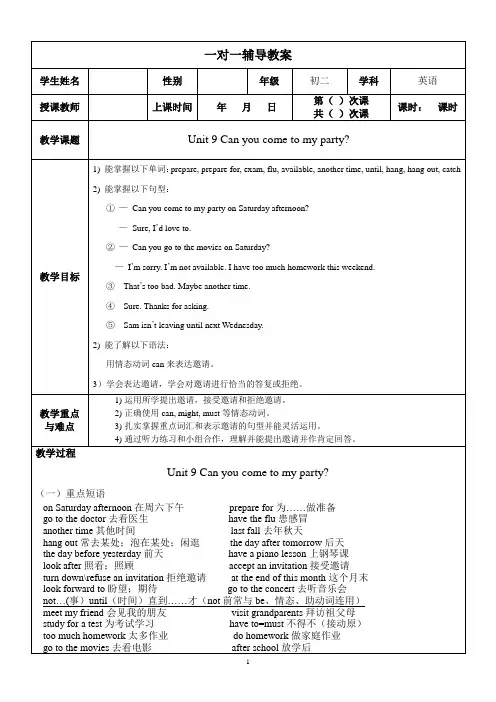
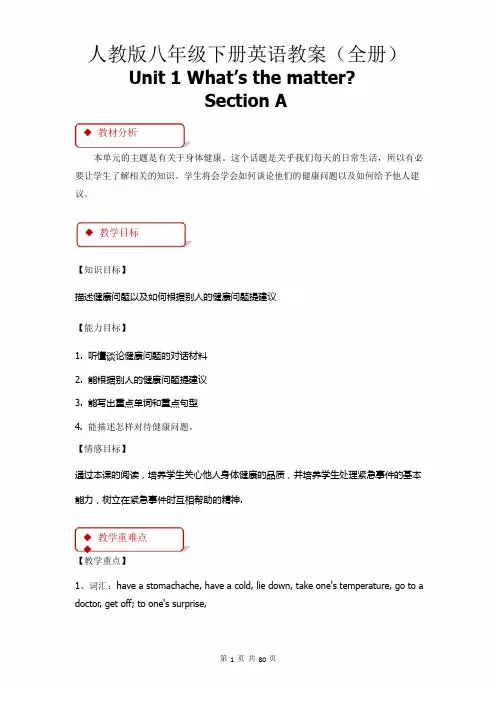
人教版八年级下册英语教案(全册)Unit1What’s the matter?Section A◆教材分析本单元的主题是有关于身体健康。
这个话题是关乎我们每天的日常生活,所以有必要让学生了解相关的知识。
学生将会学会如何谈论他们的健康问题以及如何给予他人建议。
◆教学目标【知识目标】描述健康问题以及如何根据别人的健康问题提建议【能力目标】1.听懂谈论健康问题的对话材料2.能根据别人的健康问题提建议3.能写出重点单词和重点句型4.能描述怎样对待健康问题。
【情感目标】通过本课的阅读,培养学生关心他人身体健康的品质,并培养学生处理紧急事件的基本能力,树立在紧急事件时互相帮助的精神.◆教学重难点◆【教学重点】1、词汇:have a stomachache,have a cold,lie down,take one's temperature,go to a doctor,get off;to one's surprise,2、句型:1.——What's the matter?——I have a stomachache.You shouldn't eat so much next time.2.——What's the matter with Ben?——He hurt himself.He has a sore back.——He should lie down and rest.【教学难点】掌握情态动词should shouldn't.的用法;学习have的用法◆课前准备◆Multimedia,group work,cooperative discussion.◆教学过程Step1.Warm up1.Look at the picture and learn the parts of the body.2.New words and phrases.Step2Presentation1.1aLook at the picture.Write the correct letter[a-m]for each part of the body.Then check the answers.2.1bFirst,lead Ss to read the five names.Then look at the picture.Number the names1-5.’sFinally, check the answers.3. 1cDivide two Ss into a pair to make conversations. Finally, invite several pairs to act outfor the class.Step 3 Practice1. 2aTell Ss there are five conversations. In each conversation the person says what goingon with them. Listen carefully and number the pictures.Play the tape. Then check the answers.2. 2bAsk Ss to listen to the recording again to match the problems with the advice.Play the recording again. Then check the answers.3. 2cAsk Ss to make conversations using the information in 2a and2b. Give them enoughtime to do this task. Later , invite several pairs to present their conversations to theclass.Step 4 Consolidation1. 2dFirst, ask Ss to have a fast reading of the conversation to get the main idea.Then, lead Ss to read the conversation sentence by sentence, explain some languagepoints.Finally, divide Ss into pairs to practice role-playing the conversation.2. 3aFirst, read the passage quickly and answer the question.Then,lead Ss to read the passage and analyse the key points.Finally,read together.3.3bRead the passage again and check the things that happened in the story3cDiscuss the questions with a partner.4.Grammar focusFirst,lead Ss to read the sentences.Then,prompt Ss to analyse the use of model verb should.After that,explain the grammar together.5.4aAsk Ss to fill in the blanks.Then,invite some Ss to present their answers.6.4bAsk Ss to circle the best advice for these health problems,then add their own advice.After that,invite some Ss to present their advice.7.4cOne student mimes a problem.The other students in your group guess the problem and give advice.Step5Language pointsStep6HomeworkMake a conversation about health problems and giving advice.Unit1What’s the matter?Section B◆教材分析本单元的主题是有关于身体健康。
![八年级-人教版-英语-下册-[学习任务单]Unit-9-Section-A-(1a-2d)](https://uimg.taocdn.com/d4cdb49d05a1b0717fd5360cba1aa81144318fd4.webp)
Unit 9 Have you ever been to a museum? (Period 1)Section A (1a-2d)班级_________ 姓名_________学习目标学完这一课,你能够掌握:1.词汇:amusement、amusement park、somewhere、camera、invention;2.能力:从听力中提取关键信息,抓住时间、地点等关键词;3.交际功能:正确使用现在完成时(been、ever、never)谈论过去的经历。
课前学习任务【学习任务一】词汇检测1.n. 娱乐;游戏____________________2.游乐场____________________3.adv. 在某处;到某处____________________4.n. 照相机;摄影机;摄像机____________________5.n. 发明;发明物____________________【学习任务二】阅读教材第65至66页,根据汉语提示写出英文句子。
1.你曾去过科学博物馆吗?______________________________________________________________ 2.咱们明天去历史博物馆吧。
______________________________________________________________ 3.今天咱们去不同的地方吧。
______________________________________________________________ 4.它真的很有趣,不是吗?______________________________________________________________ 5.我还了解了一些发明,它们成就了彩色电影。
______________________________________________________________ 6.我们搭起帐篷并在外面做饭。

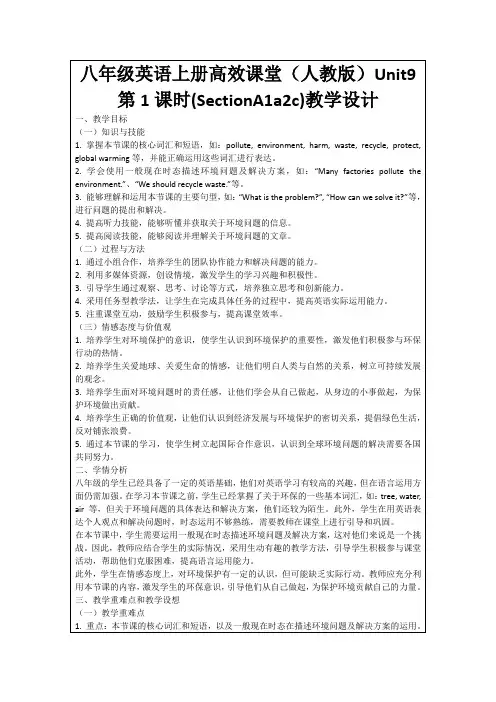
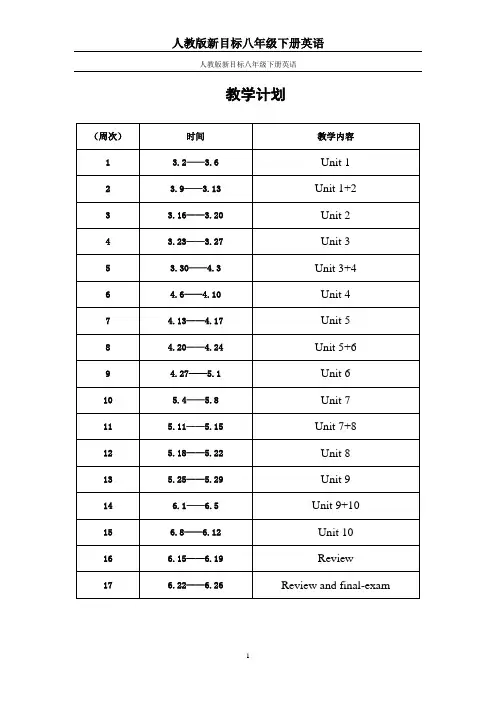
人教版新目标八年级下册英语教学计划Co ntents(教案目录)Unit 1 What's the matter?......................................................1(6课时)Unit 2 I'll help to clean up the city park...............................25(6课时)Unit 3 Could you please clean your room?.........................48(6课时)Unit 4 Why don't you talk to your parents? ........................70(6课时)Unit 5 What were you doing when the rainstorm came? ...94(6课时)Unit 6 An old man tried to move the mountains. ...............117(6课时)Unit 7 What's the highest mountain in the world? ...........139(6课时)Unit 8 Have you read Treasure Island yet? .......................156(6课时)Unit 9 Have you ever been to a museum? ..........................173(6课时)Unit 10 I've had this bike for three years. ..........................187(6课时)周星期2015年_月__日第周星期总第__课时2015年__月__日第周星期总第__课时2015年_月__日第周星期总第__课时2015年_月__日第周星期总第__课时2015年_月__日第周星期总第__课时2015年_月__日第周星期总第__课时2015年_月__日第周星期总第__课时2015年_月__日第周星期总第__课时2015年_月__日第周星期总第__课时2015年_月__日第周星期总第__课时2015年_月__日第周星期总第__课时2015年_月__日第周星期总第__课时。
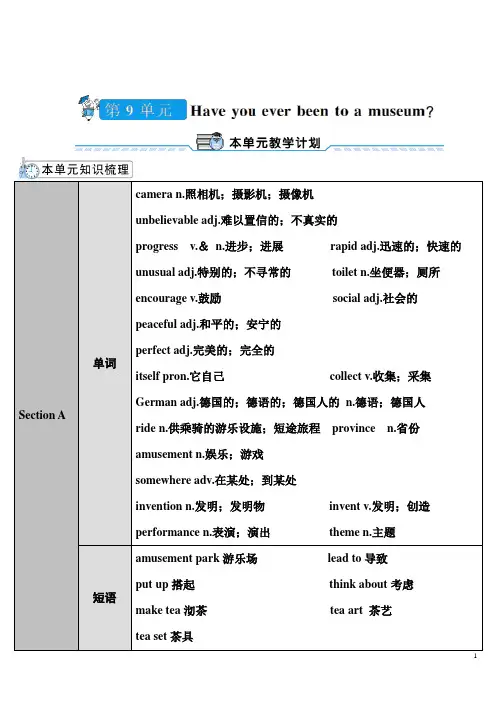
Section A 单词camera n.照相机;摄影机;摄像机unbelievable adj.难以置信的;不真实的progress v.&n.进步;进展rapid adj.迅速的;快速的unusual adj.特别的;不寻常的toilet n.坐便器;厕所encourage v.鼓励social adj.社会的peaceful adj.和平的;安宁的perfect adj.完美的;完全的itself pron.它自己collect v.收集;采集German adj.德国的;德语的;德国人的n.德语;德国人ride n.供乘骑的游乐设施;短途旅程province n.省份amusement n.娱乐;游戏somewhere adv.在某处;到某处invention n.发明;发明物invent v.发明;创造performance n.表演;演出theme n.主题短语amusement park游乐场lead to导致put up搭起think about考虑make tea沏茶tea art 茶艺tea set茶具equator n.赤道短语take a holiday度假three quarters四分之三at night在夜晚all year round全年be close to 靠近be far from远离……thousands of 数以千计的;许许多多的whether…or…不管……还是……on the one hand…on the other hand…一方面……另一方面……句型1.On the one hand,more than three quarters of the population are Chinese,so you can simply speak Putonghua a lot of the time. On the other hand,Singapore is an English-speaking country,so it’s also a good place to practice your English! 一方面,超过四分之三的人口是华裔,因此很多时候你可以只说普通话。
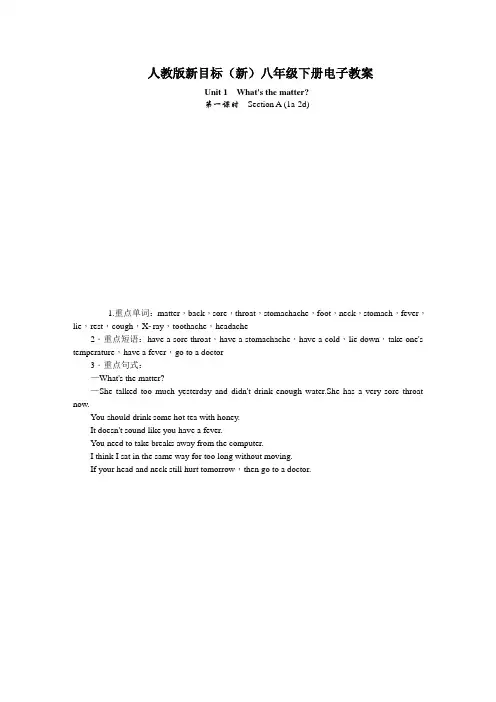
人教版新目标(新)八年级下册电子教案Unit 1What's the matter?第一课时Section A (1a-2d)1.重点单词:matter,back,sore,throat,stomachache,foot,neck,stomach,fever,lie,rest,cough,Xray,toothache,headache2.重点短语:have a sore throat,have a stomachache,have a cold,lie down,take one's temperature,have a fever,go to a doctor3.重点句式:—What's the matter?—She talked too much yesterday and didn't drink enough water.She has a very sore throat now.You should drink some hot tea with honey.It doesn't sound like you have a fever.You need to take breaks away from the computer.I think I sat in the same way for too long without moving.If your head and neck still hurt tomorrow,then go to a doctor.1.重点短语和句型2.询问对方身体状况的句型及答语询问对方身体状况的句型及答语一、预习课本P1-2新单词并背诵,完成下面的汉译英。
1.问题____________ 2.背部____________3.疼痛的____________ 4.嗓子____________5.胃痛____________ 6.脚____________7.脖子____________ 8.胃____________9.发烧____________ 10.平躺____________11.休息____________ 12.咳嗽____________13.X光____________ 14.牙疼____________15.头疼____________二、认真预习1a-2d找出下列短语和句型。
Unit9 第1课时分层训练Ⅰ.根据句意及汉语提示写出所缺的单词1.I remember putting my bag ________ (在某处) in my bedroom.2.A ________(照相机) is a piece of equipment used for taking photos. 3.Could you please tell us about the Four Great ________(发明) of China? 4.There are plenty of ________ (娱乐活动) in the club.Ⅱ.根据汉语意思完成句子1.你爸爸曾经去过美术博物馆吗?________ your father ever ________ ________ an art museum?2.那位老人想住在安静的地方。
The old man wants to live ________ ________.3.上周末他们在森林里搭起了一个帐篷。
They ________ ________ ________ ________ in the forest last weekend. 4.“我从来没有去过美国。
”“我也没去过。
”—I________ ________ ________ to America.—________ ________.Ⅲ.按要求完成下列各题1.He's never been to Hangzhou and I've never been there either.(改为同义句) He's never been to Hangzhou. ________ ________ ________.2.You will enjoy yourself at the party.(改为同义句)You will ________ ________ ________ ________ at the party.3.We have traveled to another province of China.(改为否定句)We ________ ________ to another province of China.4.He has ever visited the space museum.(改为反意疑问句)He has ever visited the space museum, ________ ________?Ⅰ.单项填空()1.—I hear your teacher ________ to Japan once.—Yes, he ________ there last year.A.goes; went B.has been; has beenC.went; has been D.has been; went()2.—Tina, we are going to take a holiday in Europe.—________.A.That's OK B.Have a good timeC.It's wonderful D.With pleasure()3.—Have you ever seen the film The Fate of the Furious 8?—Yes. I ________ it last Sunday.A.have seen B.see C.saw D.sees()4.Cindy's never been to Beijing, ________?A.is she B.isn't she C.has she D.hasn't she()5.—I have never heard of the news.—________.A.So has Tom B.So Tom hasC.Neither Tom has D.Neither has TomⅡ.补全对话A: Hi, Tony. What are you busy with?B: Hi, Daming. 1.________A: Sounds interesting! I am very interested in spaceships.B: Do you know scientists have sent a spaceship to Mars(火星)?A: No. 2.________B: Yes, it has arrived there already.A: 3.________B: No, they haven't yet.A: Are there any astronauts in the spaceship?B: No, there aren't.A: Why not? 4.________B: Yes, but no one has been to Mars yet, because Mars is much farther than the moon.5.________A: That's interesting!A.Has it arrived yet?B.But scientists are working hard in order to send astronauts to Mars one day.C.Astronauts have already been to the moon.D.Have they discovered life on Mars?E.I've just read a book about spaceships.Ⅲ.完形填空I'm a 14year-old middle school student from Shandong. I enjoy traveling and I have been to many places. But Kunyu Mountain was the most unforgettable place I've __1__ been to.Kunyu Mountain is a place of __2__ near my hometown. My dad and I went to __3__ it in the early summer five years ago. At first I thought the top was so __4__ that I could never reach it. When I __5__,I always saw the top surrounded by many white clouds. __6__ the view was beautiful, I was not interested in looking at it. I __7__ very tired because of the 3-hour walk and I had a __8__ in my legs. However, I said to __9__ that I couldn't give up climbing because it was my dream to climb to the top. It was cold and the wind was brushing my face strongly. I succeeded in __10__ the top without the help of my dad. Seeing the mountains with large rocks around me, I smiled. I enjoyed my __11__ in reaching the top after falling over the stones several times. And I have fallen in love __12__ the beauty of nature since then.In our lives, the top is our __13__. The climbing is difficult but worth(值得) your hard work. Just prepare more so that you can __14__ get to the top. Whatever the result is, at least I have tried my best. I believe I can __15__ my dream.()1.A.ever B.never C.always D.already()2.A.scene B.travel C.interest D.attraction()3.A.climb B.run C.ride D.rush()4.A.smooth B.huge C.magic D.high()5.A.looked down B.looked up C.looked out D.looked back()6.A.If B.Though C.Since D.Unless()7.A.stayed B.kept C.felt D.turned()8.A.pain B.hurt C.rest D.shake()9.A.yourself B.herself C.himself D.myself()10.A.arriving B.getting C.reaching D.going()11.A.result B.success C.gift D.luck()12.A.for B.by C.with D.to()13.A.wish B.dream C.idea D.plan()pletely B.slowly C.finally D.carefully()15.A.promise B.understand C.make D.realizeⅣ.2018·泸州任务型阅读It was a sunny Saturday in Okjahoma City. A proud father Bobby Lewis was taking his two little boys to visit a museum. He walked up to the person at the ticket office and said,“How much is it to get in?”The person replied, “$3.00 for you and $3.00 for any kid who is older than six. We will let them in free if they are six or younger. How old are they?”Bobby replied, “One is three and the other is seven, so I guess I owe(应给) you $6.00.”The person at the ticket office said, “Hey, sir, did you just win the lottery(彩票) or something? You could have saved yourself $3.00. I couldn't have known the difference.”Bobby replied, “Yes, that may be true, but the kids would have known the difference.”As Ralph Waldo Emerson said, “Who you are speaks so loudly I can't hear what you're saying.” In challenge times when ethics(伦理) are more important than ever before, make sure you set a good example to everyone you work and live with.根据短文内容,回答下列问题。
Unit 9 Have you ever been to a museum ?Section B 2a—2e一、【教材分析】二、【教学流程】三、【板书设计】四、【教后反思】Unit9 Have you ever been to a museum自主检测题1. There have been a lot of ______(社会的)changes in the last hundred years.2. I ______(害怕)that she may lose her way in the forest.3. Jack has ______(收集)over three hundred Chinese stamps.4. Yesterday I saw five ______(日本人)on the street.5. Have you cleaned the dirty ______(厕所)yet?6. There are four seasons in a year. S______ comes after winter.7. Ji’nan is the capital of Shandong P______ .8. We don’t know w______ it’s going to rain o r not tomorrow.9. It is s______ to cross the road when the traffic light is green.10. I want to take some photos during the trip. so I will take a c______ with me二、用括号内所给词的适当形式填空。
11. It’s not ______ (simple) a question of money.12. Tina’s parents love ______ (India) food very much.13. He loves a very adventurous life while I enjoy a more ______ (peace) life.14. We saw some ______ (fox) in the zoo yesterday. They were very lovely.15. Would you like to see her ______ (perform) with me tonight?三、单项选择。
教学设计Listen again. Listen and check the boxes. Have these students ever been to these places?SciencemuseumHistorymuseumArt museum NaturemuseumSpace museum ClaudiaSarah √Step 5 SpeakingAsk and answer in pairs:A: let’s go somewhere different today.B: OK. Where do you want to go?A: Have you ever been to the space museum?B: No, I haven’t. How about you?A: …Step 6 Listening 2a 2bListen and circle the places that you hear.Listen again and circle T for true or F for false.Conversation 11. Tina went to the space museum last year. T/F2. John has never been to the space museum. T/F3. They are going to take the subway. T/FConversation 21. Linda has been to the amusement park. T/F2. Linda went to the amusement park yesterday. T/F3. Linda is going to the amusement park again by bike. T/FConversation 31. Frank had a great time at the water park. T/F2. Frank’s friend has never been to the water park. T/F3. Frank and his friend are going skating. T/FAnswer: TFT TFT FTTSpeakingLook at the map in 2a and make conversations about the places.A: Have you ever been to the space museum?B: Yes, I have. How about you?A: No, I haven’t.B: Oh, it’s fantastic. Let’s go tomorrow.A: OK. How are we going to get there?B: We can take the subway.SpeakingRole-play the conversation in 2d.Step 1 RevisionWhat do you know about Singapore?position: Where is Singapore?position: in Southeast AsiaPopulationMore than three quarters of the population are Chinese.LanguageChinese and English.FoodA lot of food from China, such as rice, noodles and dumplings.Indian food, western food and Japanese food.ZooSingapore has a special zoo called the “Night Safari”. A lot of animal only wake up at night, so this is the best time to watch them.WeatherThe temperature is almost the same all year round.Step 2 Writing3b Write an article to advertise your hometown or a place you have been to.句型:Have you ever tried/seen/been…?If you…, you will/can…You should…One great thing about …is…Step 3 Self check1. Think about the things below and write an answer for each one.1) One thing that you have collected before:_________________________________2) One invention that you have found to be very useful:_________________________________3) One unbelievable or unusual thing that you’ve seen or hea rd recently:_________________________________4) One way that you’ve used to encourage a friend in the past:_________________________________5) One peaceful and quiet place that you’ve been to recently:________________________________( )35.Which one can be the best title?A. Different animals in TanzaniaB. The ways of traveling in TanzaniaC. Why do we take a bus to travel?D. The beautiful country-TanzaniaBWhen you are in England,you must be very careful in the street because the traffic drives on the left. Before you cross a street,you must look to the right first and then the left. If the traffic lights are red,the traffic must stop. The people on foot can cross the road carefully. If the traffic lights are green,the traffic can go. The people on foot must not cross. In the morning and in the evening when people go to or come from work,the streets are very busy.When you go by bus in England,you have to be careful,too. Always remember the traffic moves on the left.So you must be careful. Have a look first or you will go the wrong way. In many English cities,there are big buses with two floors. You can sit on the second floor. From there you can see the city well. It is very interesting. ( )36.When you are in England, you must be more careful in the street because________.A. there are many cars and buses on the roadB. there are no traffic lightsC. the buses and cars move on the leftD. people on foot may cross the road( )37.In England,before you cross a street, you must look to first and then________.A. the right;the leftB.the left;the rightC. the front;the backD. the back;the front( )38. If the traffic lights are green, can go, mustn’t cross.A. the people on foot;the trafficB. the traffic;the people on bikeC. buses;carsD. the traffic;the pe ople on foot( )39. In England, you must always remember that the traffic _______.A. is busyB. moves on the leftC. moves on the rightD. with two floors ( )40. In many cities in England, there are big buses ________.A. with a lot of people in themB. with lots of seats in themC. with two floorsD. with interesting colors五.单词拼写(共10小题;每小题1分,满分10分)http://w ww.xkb 1. comA)根据首字母及汉语提示,完成下列单词的拼写,使句意明确,语言通顺。
初中英语·人教版·八年级下册——Unit 9 Have you ever been to a museum?Unit 9 Section A 第1课时测试卷测试时间:15分钟一、根据句意及首字母或汉语提示写出单词1. This summer I want to go s relaxing for a trip.2. I think the computer is a very useful i .3.—I haven’t been to the water park.—Me n .4. Mr. Green will take his little son to the ______ (娱乐) park this Sunday.5. Please take your _______(相机) with you when you go on a trip.答案:1. somewhere 2. invention 3. neither 4. amusement 5. camera二、单项选择1.(2021江苏苏州中考)The documentary A Plastic Ocean is so impressive that I _______ it several times so far.A. watchedB. watchC. have watchedD. will watch答案: C 考查动词时态。
句意:纪录片《塑料海洋》令人印象深刻,到目前为止我已经看过好几次了。
根据时间状语so far可知用现在完成时。
故选C。
2. (2021湖北黄冈中考) —Summer holiday is coming! I’m going to Hainan to see my uncle.—______.A. Thank youB. Have a good tripC. My pleasureD. Not at all答案:B 考查情景交际。
Unit 9 Have you ever been to a museum?本单元教材以“曾经去过某地”为中心话题,围绕着“现在完成时态的教学”进行,学习和运用几个常见的句型:—Have you ever been to a science museum? —Yes, I have.I went to theNational Science Museum last year./— I have never been camping. — Me neither./It also encourages governments and social groups to think about ways to improve toilets in the future./ — I have been to the art museum many times. —Me , too.And I have also visited the nature museum.等。
在学习过程中,学生在交流中,能促进师生之间的感情。
Section A主要学习几个常见的动词短语及句型Have you been to…?应掌握句型:—Have you ever been to a science museum?— Yes, I have.I went to the National Science Museum last year.等。
通过一篇短文介绍了学生们曾经去过的最有趣的博物馆,增加了学生的阅读量。
Section B安排了听、说、读、写的任务, 通过短文“Singapore—A Place You Will Never Forget !”介绍了新加坡的一些情况。
教师在教学中应合理利用课本上的知识进行教学。
课时分解.第一课时Section A(1a— 2d)Teaching Key Points 【教学重点】The vocabulary :amusement, somewhere, camera, invention , history/space/art museum , put up, have a good time , water/amusement parkTarget language:1.—Have you ever been to a science museum?— Yes, I have.I went to the National Science Museum last year.2.I have never been camping.3.It's a great way to spend a Saturday afternoon.Teaching Difficult Points 【教学难点】Use the target language above to talk about past experiences.Teaching Aids 【教学工具】an English book , a tape recorder and CAITeaching Steps 【教学过程】★ Step 1 Preview and perception 【预习感知】Ask the students to read the vocabulary and target language.I .英译汉。
Unit 9Have you ever been to a museum? 单元目标
第一课时Section A(1a-2d) 课时目标
自主学习
根据句意及音标提示写出单词及其汉语意思。
1.There is an amusement /ə’mjuːzmənt/ park in the center of the city.娱乐;游戏
2.Let’s go to the history museum /mju’ziːəm/ this weekend.博物馆
3.Why notI start with the most interesting/’IntrəstIŋ/one? 有趣的
4.My brother doesn’t like playing chess.Neither /’naIðə(r)/ do I.也不
5.What happens when we go to space /speIs/?太空;空间
教学过程
环节1新课导入
T:Have you ever been to somewhere interesting?
S1:I went to the water park last summer vacation.We swam and played in the water.It was wonderful!
S2:The most interesting place I have ever been to is the history museum.There I learned about Chinese history.
...
设计意图:通过师生之间对话的方式自然地过渡到本课时的话题上来,同时也调动了学生参与课堂的积极性。
环节2学习1a-1c
1.让学生两人一组,朗读教材P65图片中的对话。
教师邀请一组学生表演对话。
2.让学生浏览1a方框中的单词和词组,掌握每个单词和词组所表示的地点。
3.让学生按照自身情况为这些地方排序,教师邀请两位学生分享答案并给出理由。
4.让学生浏览1b的表格信息,在播放录音之前,教师引导学生根据所给信息有目的地去听。
然后教师播放录音,学生完成练习。
5.教师再次播放录音,学生整体感知录音内容,然后核对答案。
6.结对练习。
将学生分为两人一组,以1c的对话为例,就1b方框中的地点进行对话练习。
教师邀请几组学生当堂表演对话,并对学生的语音、语调进行指正。
7.要点点拨。
Me neither.
Me neither.意为“我也不”,表示前面提到的否定情况也适用于后者,相当于“Neither +be动词/情态动词/助动词+I”。
例:Amy doesn’t like eating apples.Me neither.埃米不喜欢吃苹果,我也不喜欢。
【链接】Me,too.我也是。
它表示的是前面提到的肯定情况也适用于后者,相当于“So+be动词/情态动词/助动词+I”。
8.学以致用。
(单项选择)
(C)(1)Peter doesn’t go to school by bus.________.
A.I neither B.I not
C.Me neither D.Me either
(B)(2)My sister is a student.Me,too.(选出与画线部分意思相同或相近的选项)
A.So do I B.So am I
C.So will I D.So I am
设计意图:通过对话练习,可以活跃课堂气氛,鼓励学生大胆开口,培养学生的日常交际能力;通过听力练习,有助于培养学生根据已知信息,有目的地听录音的能力。
环节3学习2a-2d
1.让学生观察教材P66上方的图片,熟悉图片中每个地点所处的大致位置,为听力练习做好准备。
2.教师播放录音,学生根据录音内容在图中圈出自己听到的地点。
3.让学生浏览2b的表格信息,把握句中的关键词,然后教师播放录音,学生完成练习。
4.教师再次播放录音,学生整体感知录音内容,并核对2a和2b的答案。
5.让学生两人一组,练习2c的对话。
然后就2a图片中的其他地点进行对话练习。
教师邀请几组学生表演对话。
6.教师邀请两名学生分角色表演2d的对话,教师注意学生在朗读时的感情以及语音、语调是否正确。
7.教师讲解对话中的重要单词、短语以及句子。
8.要点点拨。
It’s really interesting,isn’t it?
这是一个反意疑问句。
反意疑问句是针对某一事件提出疑问并向对方求证的问句。
它由两部分构成,前一部分是陈述部分,后一部分是附加疑问部分。
反意疑问句的基本形式是“前
肯后否”或“前否后肯”,意为“……,是吗/不是吗?”例:You
are a student,aren’t you? 你是一名学生,对吗?【注意】当反意疑问句的陈述部分以let’s开头时,附加疑问部分用shall we? 当反意疑问句的陈述部分以let us开头时,附加疑问部分用will you?
9.学以致用。
(把反意疑问句补充完整)
(1)You are Jenny’s sister,aren’t you?
(2)Jack didn’t pass the exam,did he?
(3)Miss Smith is our new English teacher,isn’t she?
(4)Let’s go shopping this afternoon,shall we?
(5)Let us go out to play football,will you?
设计意图:听力练习的设计旨在培养学生在听录音的过程中抓取关键信息的能力;对话的练习既可以增进学生之间的友谊,又能让学生在练习对话的过程中熟悉有关问答地点的词汇和句型。
板书设计
练习设计
请完成本课对应训练!。